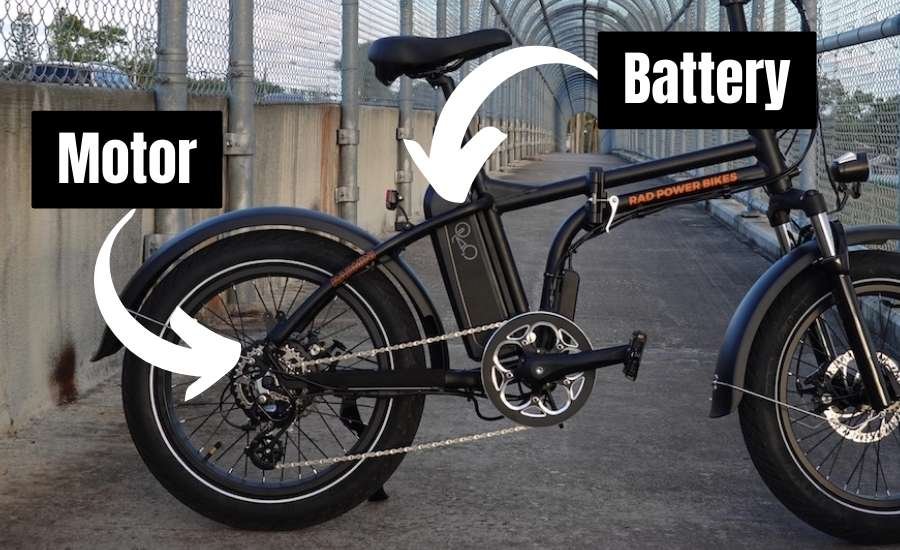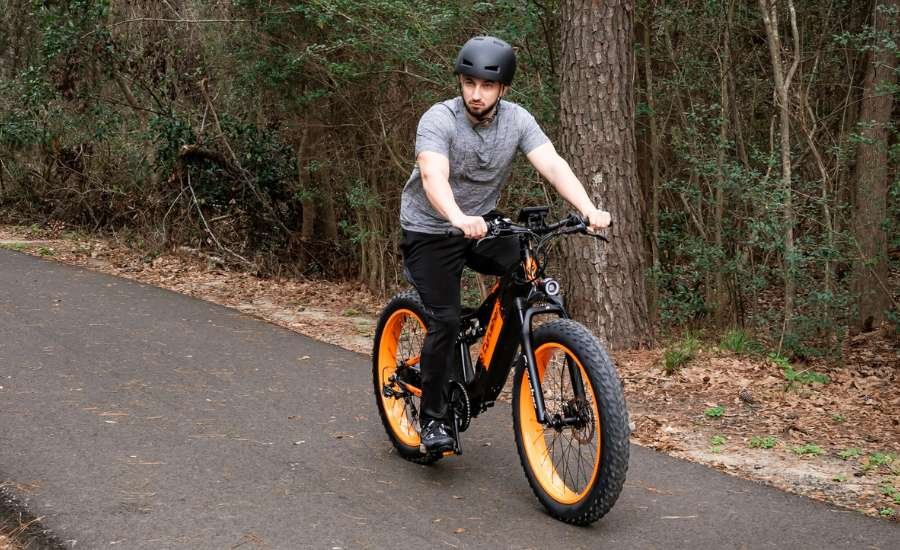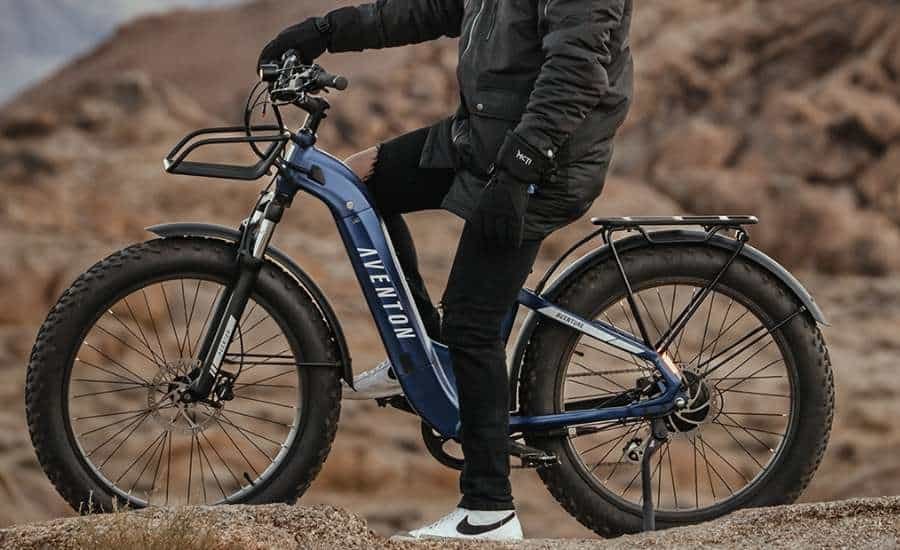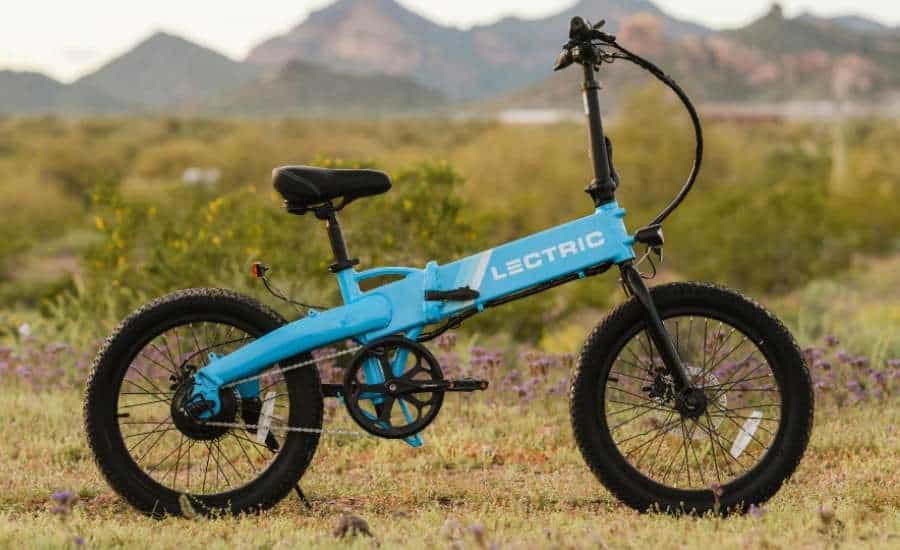Have you ever tried lifting an electric bike and felt like you were hefting a small boulder? Despite their many benefits, e-bikes can be significantly heavier than traditional bicycles, making them a challenge to maneuver for some riders.
In fact, it may surprise you to learn that electric bikes can weigh nearly twice as much as regular bikes, or sometimes even more. And since the weight of e-bikes is a common issue that riders face, especially when it comes to transportation or storage, it’s worth asking: why are e-bikes so heavy?
In this post, we’ll explore the various factors that contribute to the weight of electric bikes and why it’s an important consideration for riders. By gaining a deeper understanding of the reasons behind e-bike weight, you’ll be better equipped to make informed decisions when selecting the right bike for your needs. So join us on this journey as we uncover the mysteries behind the weight of electric bikes!
How Heavy is the Average Electric Bike?

The weight of an electric bike varies depending on several factors, including the size and capacity of the battery, the weight of the motor, the materials used to construct the frame, and any additional accessories.
On average, electric bikes weigh anywhere between 40 and 70 pounds. However, some electric bikes can weigh as little as 22 pounds, while others can weigh up to 100 pounds or more.
Before making a purchase, It is essential to consider the weight of an electric bike. While a heavier electric bike may be more durable and have a longer range, it can also be more challenging to maneuver and transport. On the other hand, a lighter electric bike may be more comfortable to ride, but it may not have as long of a range or be as durable as a heavier electric bike.
Therefore, when selecting an electric bike, it is important to choose a model that suits your specific needs and preferences. Consider factors such as the intended use of the bike, the terrain you will be riding on, and your physical ability. It may also be helpful to test-ride several different models before making a final decision.
In conclusion, the weight of an electric bike can vary significantly, with most models weighing between 40 and 70 pounds. Prospective buyers should consider their individual needs and preferences when selecting an electric bike, taking into account factors such as durability, range, and maneuverability. By selecting a model that suits their specific needs, riders can ensure a comfortable and efficient riding experience.
Why Are Electric Bikes So Heavy?

The added weight of electric bikes compared to traditional bikes is a frequent criticism that prompts people to question why e-bikes are so heavy.
The main reason that electric bikes are heavier than traditional bikes is the addition of the electric motor and battery. These components are necessary to power the e-bike and provide the rider with electrical assistance, but they also add a significant amount of weight to the e-bike. Depending on the size of the motor and battery, these two parts can add anywhere from 10 to 20 pounds or more to the overall weight of the bike.
Another factor that contributes to the weight of e-bikes is the frame. In order to accommodate the additional weight of the motor and battery, e-bikes need to have a sturdy frame that can handle the extra load. This often means using heavier materials such as steel or aluminum, which adds to the total weight of the e-bike.
Additionally, electric bikes require more materials and components than traditional bikes. For example, electric bikes have additional wiring and electronics, a controller, and a display screen. These components also contribute to the total weight of electric bikes.
Furthermore, the weight of electric bikes can vary depending on the type of e-bike as well. For example, electric mountain bikes are designed to handle rough terrain and require a heavier frame and components to support this type of riding. Conversely, electric road bikes are designed for speed and portability and therefore are built with lighter materials.
While the added weight of e-bikes may be a drawback for some riders, it is important to note that the benefits of electrical assistance often outweigh the extra weight. The pedal-assist function of e-bikes makes cycling more effortless in comparison to conventional bicycles, despite the weight increase.
In conclusion, electric bikes are heavier than traditional bikes due to the added weight of the motor, battery, and additional components. However, this does not mean that electric bikes are not worth considering. The electrical assistance offered by e-bikes typically makes cycling easier compared to traditional bicycles, even though they are heavier.
The Impact of Weight on the Performance and Efficiency of Electric Bikes

The weight of an electric bike affects how well it performs and how efficiently it runs for various reasons. Firstly, the weight of an e-bike can impact its acceleration and maximum speed. A heavier e-bike may require more energy to move, resulting in slower acceleration and lower top speed. On the other hand, a lighter e-bike may accelerate more quickly and achieve a higher maximum speed due to its reduced weight.
Secondly, the weight of an e-bike also affects its range. A heavier e-bike may require more power to maintain the same speed and travel the same distance as a lighter e-bike. This increased power consumption can result in a shorter range for the heavier bike, reducing its overall efficiency.
However, it’s important to note that a heavier e-bike may also come equipped with a larger battery, which can extend its range and provide more assistive power.
Additionally, the weight of an e-bike can also affect its handling and stability. A heavier e-bike may feel more stable and comfortable to ride, especially on uneven terrain. However, it may also feel less maneuverable and require more effort to handle, particularly in tight spaces.
In conclusion, the impact of weight on the performance and efficiency of electric bikes cannot be ignored. Understanding the effects of weight on electric bikes can help riders make informed decisions when purchasing an electric bike and optimizing their overall riding experience.
What is a Good Weight for an Electric Bike?

The ideal weight for an electric bike depends on several factors, including the rider’s weight, riding style, and intended use.
For most riders, a good weight for an electric bike is between 40 to 60 pounds. This weight range strikes a good balance between performance, comfort, and portability. Electric bikes within this weight range are usually equipped with a sufficiently powerful motor and a good-capacity battery, providing an excellent balance of power and range.
For riders who prioritize portability and speed, a lighter electric bike may be more suitable. These bikes typically weigh between 30 to 40 pounds and feature a smaller battery and motor. While they may sacrifice some range and comfort, lighter electric bikes are more agile and easier to maneuver, making them a good choice for urban commuting or recreational riding.
On the other hand, riders who prioritize comfort and stability may prefer a heavier electric bike. These bikes usually weigh between 60 to 80 pounds and feature a larger battery and motor. While they may be less nimble and more challenging to transport, heavier electric bikes provide a smoother and more stable ride, making them a good choice for long-distance touring or off-road riding.
Ultimately, the best weight for an electric bike depends on the rider’s personal preferences and intended use. Therefore, It’s essential to test-ride different electric bike models to determine the ideal weight and features that meet your needs.
Will E-bikes Get Lighter?

As technology continues to advance, manufacturers are finding ways to make e-bikes lighter without sacrificing performance or range. Currently, the main factors contributing to the weight of e-bikes are the battery and motor. As battery and motor technology improves, their size and weight will likely decrease, making e-bikes lighter overall.
Additionally, manufacturers are already experimenting with new materials and designs to make e-bikes lighter without sacrificing durability or performance. For example, some e-bikes are now being made with carbon fiber frames, which are lighter than traditional metal frames while still providing sufficient strength and stability.
However, it’s important to note that while e-bikes may get lighter in the future, they may also become more expensive due to the cost of new materials and technologies. It’s also possible that some e-bike models will prioritize power and range over weight reduction.
Overall, it’s safe to say that e-bikes will continue to evolve and improve in the future, and weight reduction will likely be a key area of focus for manufacturers.
However, it is important to note that e-bikes will never be as light as traditional bicycles due to the added weight of the battery and motor. As such, it is important for riders to consider their individual needs and preferences when choosing an e-bike, taking into account factors such as range, power, and weight.
In conclusion, while e-bikes may never be as light as traditional bicycles, they will likely continue to get lighter as technology and design advancements are made. Therefore, it is important for riders to stay informed about the latest developments and options available to them.
Factors to Consider When Choosing an Electric Bike Based on Weight and Intended Use

When considering purchasing an electric bike, it is important to take into account both the weight of the bike and your intended use. Below are some factors to consider:
🔲 Terrain: The terrain you plan to ride on is a crucial factor to consider when choosing an electric bike based on its weight. If you plan on taking your electric bike off-road or on hilly terrain, a heavier electric bike with a more powerful motor may be necessary. However, if you plan on riding on flat terrain, a lighter e-bike may be more suitable.
🔲 Portability: If you plan on transporting your electric bike often, a lighter-weight e-bike may be more convenient. Consider whether you will need to lift the electric bike onto public transportation, or a car rack, or carry it upstairs frequently. Keep in mind that heavier electric bikes may pose more difficulties when it comes to storing and transporting them.
🔲 Riding Style: Your riding style should also be considered when choosing an e-bike based on weight and intended use. If you prefer a more leisurely ride, a heavier bike may not be an issue. However, if you are more of a speed demon, a lighter electric bike may be more suitable, as it can provide a faster and more responsive ride.
🔲 Range: The weight of an electric bike will also play a significant role in determining how far you can travel on a single charge. Heavier electric bikes require more power from the motor to move, which will ultimately result in a reduced range when compared to lighter alternatives. However, heavier e-bikes also tend to come with a larger battery which may allow you to cover more distance.
🔲 Rider’s Size: The rider’s size will also play a role in determining the weight of your electric bike. A heavier e-bike may be more suitable for larger riders, while a lighter e-bike may be better for smaller riders.
In summary, when choosing an electric bike based on weight and intended use, it is important to consider factors such as terrain, portability, riding style, etc. A thorough evaluation of all these factors can help you make an informed decision and choose the electric bike that is best suited to your needs.
FAQs
What e-bike is the lightest weight?
The title for the lightest electric bike is constantly changing as new models come out. As of now, the Hummingbird folding electric bike claims to be the lightest electric bike, weighing only 22.7 pounds.
Are electric bikes too heavy?
The answer to this question depends on personal preferences and intended use. While electric bikes tend to be heavier than traditional bicycles, they also provide added features like electrical assistance which makes riding them easier. Some riders may find the added weight to be a drawback, but for others, it may be a necessary tradeoff for the benefits that e-bikes offer.
Does the weight of an electric bike affect the speed?
The weight of an e-bike can typically affect its speed as heavier e-bikes require more power to move, and as a result, may have a slightly lower top speed than lighter e-bikes. However, the motor power and design can also play a significant role in determining speed, so it is important to consider all factors when choosing an electric bike.
Are there any benefits to having a heavier electric bike?
Heavier electric bikes can generally provide more stability and a smoother ride due to their added weight and improved components. They also typically come with a more powerful motor and a higher-capacity battery.
Does the weight of an electric bike affect its performance?
The weight of an electric bike can typically affect its performance, especially when it comes to acceleration, speed, and maneuverability.
Should I choose a lighter electric bike over a heavier one?
It depends on your specific needs and preferences. If you need to lift or transport your bike frequently, a lighter model may be more suitable. However, if you prioritize stability and durability, a heavier e-bike may be a better choice.

